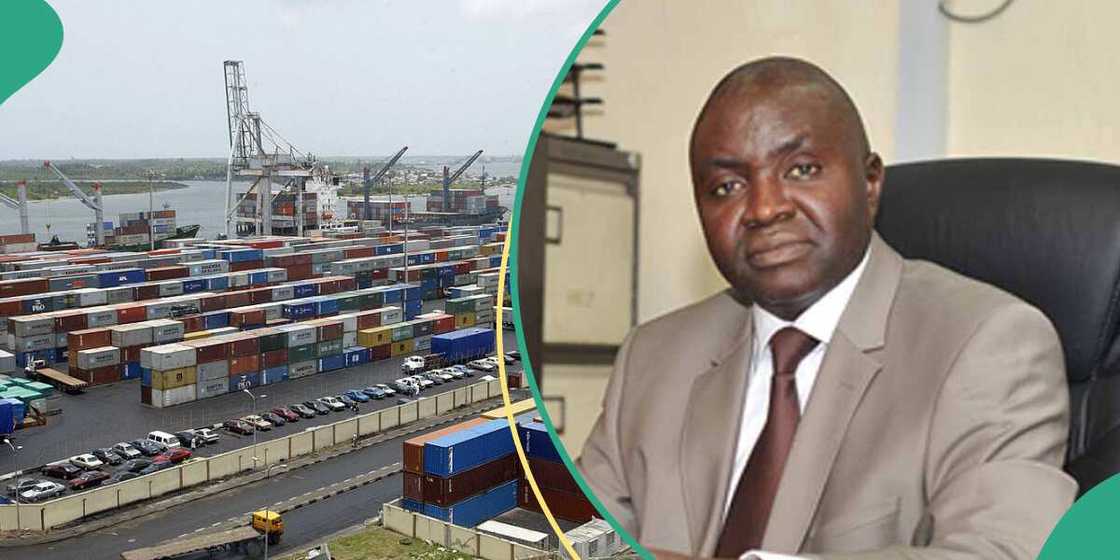Expert Sends Urgent Message to CBN As Customs Exchange Rate Changes Again
- The Central Bank of Nigeria has once again increased Nigeria's customs duty rates for clearing goods at ports
- This comes as the value of the naira has depreciated in both the official and unofficial foreign exchange markets
- Muda Yusuf, the CEO of CPPE, has issued an urgent message to the CBN, stressing the need for a change in its customs duty policy
Legit.ng journalist Dave Ibemere has over a decade of business journalism experience with in-depth knowledge of the Nigerian economy, stocks, and general market trends.
Muda Yusuf, the CEO of the Centre for the Promotion of Private Enterprise(CPPE), has urged the Central Bank of Nigeria (CBN) to change its policy on the Customs import duty rate to clear goods at ports.

Source: Facebook
The CBN had earlier directed customs and related parties to adopt the closing rate in the official foreign exchange (FX) window for import duty.
According to the CBN, the FX rate at the point of importation should be used for import duty assessment until the termination date and clearance are finalised.
PAY ATTENTION: Click “See First” under the “Following” tab to see Legit.ng News on your Facebook News Feed!
Since the adoption, the customs duty rate has jumped to as high as N1,600 to a dollar.
The federal government's trade portal showed the import duty rate at N1,578.26 to a dollar on Sunday, August 18, 2024.
Expert calls for policy change
Yusuf, the CEO of CPPE, told Legit.ng that it is important that the CBN review its policy and peg the exchange rate at N1,000/$.
He believes that a significant policy adjustment is necessary to complement current measures to address the country's ongoing cost-of-living crisis.
His words:
"The high and volatile exchange rate for import duty assessment is fueling the already high inflation, increasing production and operating costs for manufacturers and other businesses, worsening the cost-of-living crisis, putting maritime sector jobs and investments at risk and weakening investors’ confidence.
"There is also the added heightened risk of cargo diversion to neighboring countries and smuggling which could jeopardize the realization of customs revenue target.
"This situation additionally creates serious competitiveness challenges for ethical and compliant investors in the economy because of their relatively elevated production and operating costs.
"In the light of this, the CPPE is reiterating its appeal to the presidency to peg the customs duty exchange rate at N1000/$ for the next six months in the first instance through an Executive Order. This resonates with the current federal government’s commitment to alleviating the current hardships on the citizens and the burden on businesses.
The current customs duty exchange rate on the Nigeria Customs Service portal is N1578/$. This rate has been changing almost weekly, which is not good for the investment environment.
It is important to clarify that this proposition is without prejudice to the ongoing foreign exchange reforms of the present administration. Contrary to concerns expressed in some quarters, the adoption of lower exchange rate for computation of customs duty would not undermine the current foreign exchange reforms. It is not a request for a concessionary exchange rate for forex allocation.

Read also
Bank directors make new proposition as they oppose billionaire Otedola, Elumelu over windfall tax
Solution to Customs exchange rate
The renowned economist emphasised that adopting a lower exchange rate for customs duty calculation is a trade policy issue distinct from foreign exchange policy.
Muda continued:
"The Central Bank of Nigeria (CBN) should be responsible only for opening Form M for importers under the existing foreign exchange policy, while matters related to international trade should fall within the purview of the Federal Ministry of Finance and the Federal Ministry of Trade and Investment. CPPE contends that the CBN's current role in determining the customs duty exchange rate is an overreach into trade policy, which needs to be urgently corrected.
"To address this issue permanently, CPPE suggests that it may be necessary to amend the Customs Act to transfer the responsibility for determining the applicable exchange rate for import duty payments to the fiscal authorities.
"This would align such rates with the government's trade policy direction and eliminate the uncertainty currently surrounding international trade. CPPE argues that Nigeria's unique economic circumstances demand localized and adaptive policy models to ensure economic stability and growth."
Nigeria Customs begins distribution of free food
Earlier, Legit.ng reported that the Nigeria Customs Service (NCS) has begun the distribution of seized food items across Nigeria.
The comptroller-general of Customs, Adewale Adeniyi, stated that the Nigerian government had asked that the seized food items be distributed to ease Nigerians' current hardship.
PAY ATTENTION: Unlock the best of Legit.ng on Pinterest! Subscribe now and get your daily inspiration!
Source: Legit.ng





